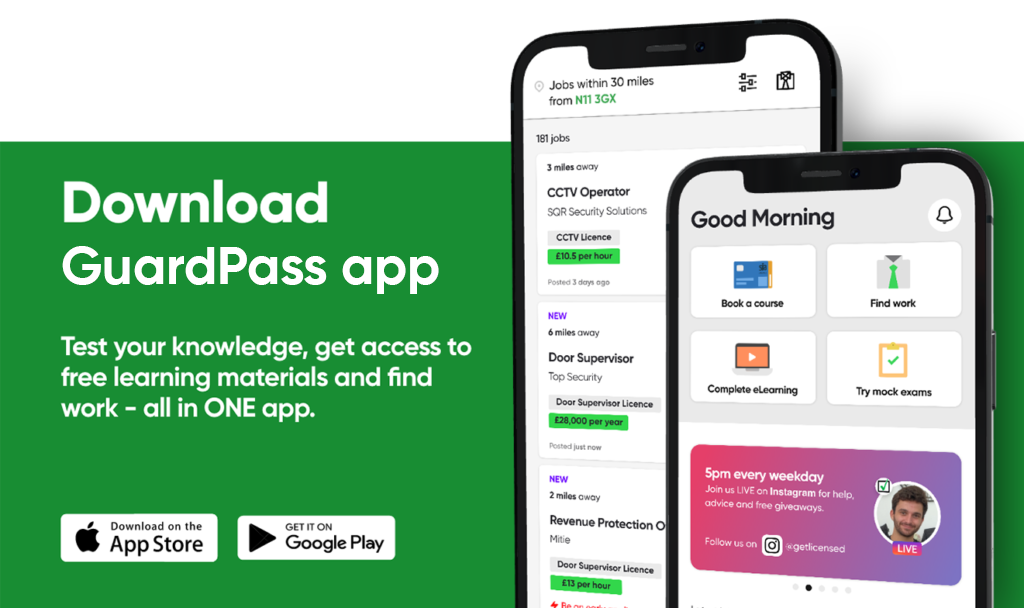Let’s be completely honest. Winning contracts and finding new business is not easy. Most security companies seem to start when someone senior in a company procurement department turns to a friend or acquaintance to ask if they would be interested in providing security services for them. So, all of a sudden you are supplying 2 security officers per shift, covering 2 sites, day and night. You find yourself providing 336 invoiced hours per week, and you’re in the security business.

You’ve obtained the required insurance. Your officers are PAYE employed. You have a decent uniform supplier and the required employer’s contributions, pension contributions, and taxes are being paid. So what next?
Brace yourself. You are about to become an expert at marketing, advertising, promotion and networking.
Before you can go and actively seek new business, however, you will need a few things.
Firstly, a decent company website. It doesn’t have to cost much to set up or maintain, despite some thinking to the contrary, but it must look professional and contain some essential information:
- To start with, your company name must imply professionalism, reliability, and integrity. “Gary’s Guarding” probably isn’t going to get your company on to many tender shortlists.
- A simple by memorable company logo and slogan. Be concise and compelling as these things will go on business cards, company letterheads and promotional material.
- CONTACT INFORMATION. The greatest website in the world is pointless unless you provide simple and easy methods for potential clients to get in touch. A phone number is essential, with a professional sounding answer message, if you are genuinely unable to take the call. You also need a corporate email address as it may be preferable for the enquiry maker. Be careful here. Spend out a couple of pounds a month and purchase the domain name for your company, enabling you to use professional email addresses like: Admin@PretorianGuarding.com or Ian.Lee@SuperbSecurity.co.uk (Both made up….. Hopefully.) These look professional and really make a difference. Gary@Sky.co.uk or Bob@Gmail.com do not give out the right professional message.
- Detail the services you can provide. Consider working in partnership with a local cleaning or maintenance company if a potential client wants a complete FM soft services package, but you only provide security officers.
- List the regions you cover. Be honest. Stating you have national coverage will start to prove problematic when you find yourself having to travel hundreds of miles for meetings, or worse, you have to recruit, train, then supervise staff, for a contract that takes you 4 hours to reach. This may make maintaining a contract not just hugely time consuming, but potentially not financially viable.
- Highlight your appealing professional and personal, qualifications and characteristics. Include a good quality, professional looking head and shoulders photo of yourself in a business suit. Doesn’t have to be professionally taken. Mine were taken by my Wife, with me standing against the white wall in our dining room. You need to look like someone that a client can do business with so no action shots, catalogue poses or amusing facial expressions.
- Think hard about what makes your company stand out from the crowd. Feature these Unique Selling Points (USPs) prominently. Please avoid gimmicks or business practices that suggest desperation or naivety.
- Make sure everything is clearly laid out, spelling and grammar are correct, and that any photos and graphics have been taken by you, or that the copyright has been paid for.
- Lastly ensure that the website looks clear and professional on a smartphone as well as a desktop PC.
Then you’ll need promotional and branded material.
- Business cards with clear print, company logo and full contact info.
- Company letterheads, used for all letters and correspondence with clients and potential clients (everyone else!)
- A company promotional flyer. A5 double sided featuring all the important information from the company website, contact info, and why your organisation is so great.
- A5 size branded notebooks with pen are also great. Not only for you to use at meetings, but they make a great gift for clients and potential new customers.
You will need a CRM database.
- Create an excel spreadsheet. Note down full details of current customers, addresses, contact points, services provided, annual review dates and every time you speak to them and why.
- Then enter details of potential clients. People you are in conversation with. Their requirements, discussion points and follow up arrangements.
- Finally create an extensive list of desired customers. Addresses and contact information. Names of people responsible for security and procurement. Services used. Type and date of initial approach. Schedule for follow up action.
- Ensure that you check every single day to see if you need to make a follow up call to somebody, or provide some required information. ALWAYS keep your promises to get in touch or provide information.
- Send out promotional flyers or more detailed speculative letters to your list of desired clients, but always follow up with an email within 3 weeks. Never be pushy or arrogant. Make all approaches appealing and highlight why you would provide a better service than current providers. Follow up with a phone call a month later, but don’t be a pest. You are now on that company’s RADAR and only get back in touch 4 months prior to the end of their current service contract.
- List every approach and dates and times on the CRM spreadsheet, and follow up when you need to.
Many potential clients will not accept tender applications from companies that do not have a sometimes bizarre list of compliance certificates.
- As has been mentioned many times and in many places before, most customers will require their security service providers to be ACS Approved. The client rarely knows what this actually means and mistakenly thinks that it is some kind of guarantee of quality. Regardless, you will need to obtain this ASAP or you massively restrict you potential customer base.
- With GDPR being so important, and with so many companies holding information about each other, CYBER ESSENTIALS certification is highly desirable and often required.
- The ISO 9001 Quality management standard is increasingly required from tendering companies.
- To demonstrate that companies are not exploiting their staff, being a Living Wage Foundation recognised service provider, makes a powerful statement that you take the welfare of your people seriously.
Some companies ask for phenomenal levels of public liability insurance cover from their security service providers.
- Make sure that your insurance is above the specification required by a potential customer. You’ll normally need to provide a letter from the insurer or current certificate of insurance to confirm this. If the required amount seems unreasonable, do not be afraid to ask for clarification for the need for such high cover, during the tender process.
Ok. Give yourself a pat on the back. You have the foundations on which to build a decent Security / FM company. But what next?

NETWORK! Get yourself out there.
- Visit trade shows. Chat to FM companies. Meet the movers and shakers and get on their RADAR.
- Join industry trade organisations. (BSIA, NSI, The Security Institute, the International Foundation for Protection Officers, the Institute for Strategic Risk Management, the Guild of Security Industry Professionals, ASIS.)
- Attend as many events as possible. Fight your natural introversion and shake hands. Get your business cards out to everyone! You never know who your next customer or service partner will be.
Build your brand on Social Media.
- To reach potential new security officers, a Facebook page is a must.
- For business promotion, and to develop those oh-so-important contacts, LinkedIn is vital.
- Twitter and Instagram are useful, as long as you have the time to keep then relatively up to date.
- Beyond that, until your company is at a size that can justify a MarComs manager, leave it there.
Sign up with some of the more effective tender identification services.
- These organisations match your services with companies putting out tenders. One of the best is called Opportuni, but there are a selection. Do some research, but hunting down appropriate tenders is essential.
Please keep a few things in mind.
- Don’t try to compete on price. A small company hasn’t the financial clout to take a minuscule profit margin. Charge more, but justify it based on how you would go the extra mile to fulfil the requirements and needs of the potential client. Accepting a minuscule charge rate will mean that you will not attract decent officers, be able to spend time on staff training and development, and generally fulfil the promises you will inevitably make during the competitive tender process. This will damage your company reputation and hurt future expansion by word-of-mouth recommendations.
- There will come a time when a decent Business Development Manager will be essential for growth. Pick the most experienced individual, with the biggest contact book, and do not expect results in six months! For a good BDM to woo companies to your door will take 12 – 18 months before things start to happen so don’t expect instant results. It is reasonable, however, for you to require a weekly movement planner or business plan from the BDM.
- Do not give in to sales fatigue. Keep grinding out the speculative introductory letters. Keep meeting new people. Get nominated for industry awards and go to the ceremonies with a pocket full of business cards. Keep making contacts and let your company name spread organically. I have heard it said that success in the industry is down to luck. Have a look at the top players in the sector. It is clear that the harder you work, the “luckier” you will be!
- If you have a few thousand pounds earmarked for advertising, think about the target audience, area of effective reach and value for money. I’d take a long look at radio advertising. Everyone fast forwards past TV ads these days, and nobody buys a newspaper to look for services to buy, but listening to the radio at work or in the car, the adverts always run.
- NEVER FORGET THE BASICS. Make sure you do a great job for your existing clients. Look after your staff. Build a reputation for quality, and let your clients and employees be your ambassadors!













